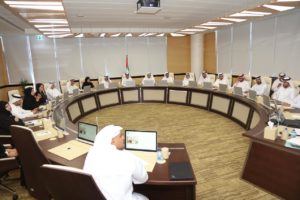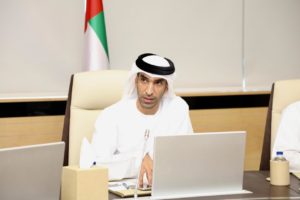UAE Council For Climate Change And Environment Reviews Environmental Initiatives During Second Meeting Of 2019
The UAE Council for Climate Change and Environment held its second meeting of 2019 at the headquarters of the Ministry of Climate Change and Environment (MOCCAE) in Dubai. Chaired by His Excellency Dr Thani bin Ahmed Al Zeyoudi, Minister of Climate Change and Environment, the meeting reviewed some of the key environmental initiatives that had been implemented or are currently underway across the UAE.
In addition to the council members, the meeting drew the participation of key environment stakeholders from federal and local entities in the country.
His Excellency Dr Al Zeyoudi highlighted the importance of the Council’s meetings in charting the way forward for projects and initiatives that address the UAE’s most crucial environmental challenges.
As a first order of business, the Council reviewed the progress achieved to date on the campaign rolled out by MOCCAE in 2018 to eradicate the red palm weevil through leveraging latest technologies to detect and combat the pest, as well as treat the afflicted trees.
The second topic on the meeting agenda was illegal logging. The practice that involves cutting off native trees and selling the timber to hawkers or at local markets, violates Federal Law No. 24 of 1999 related to the protection and development of the environment and Ministerial Resolution No. 18 of 2018 that focuses on the cultivation of local plants and conservation of nature. Council members proposed ways to counter illegal logging through raising awareness of its adverse environmental impacts, placing warning signs and securing roads in mountainous and desert areas, enforcing more stringent penalties, and expanding the country’s overall green cover.
The meeting also highlighted the risks posed by hawkers selling palm seedlings. Some of the risks include the spread of red palm weevil, which causes enormous financial losses for the country and its farmers, and the introduction of palm species of unknown origins and types that are then sold to farmers as high quality palm trees for a hefty price.
Furthermore, Council members reviewed the recommendations of the Coordinating Council of Municipal Affairs at its last meeting that focused on hawkers selling palm seedlings and convened MOCCAE officials and representatives of local municipalities. The recommendations urged concerned entities to launch extensive campaigns to raise awareness on the topic and suggested that local authorities ban the selling of palm seedlings on highways and seize the vehicles displaying them for sale. The Coordinating Council of Municipal Affairs also recommended during the last meeting that MOCCAE follow-up and coordinate with local authorities to prevent any violation of the federal environmental regulations.
Council members also presented an overview of the progress achieved in the National Climate Adaptation Program, particularly in the infrastructure and health sectors.










